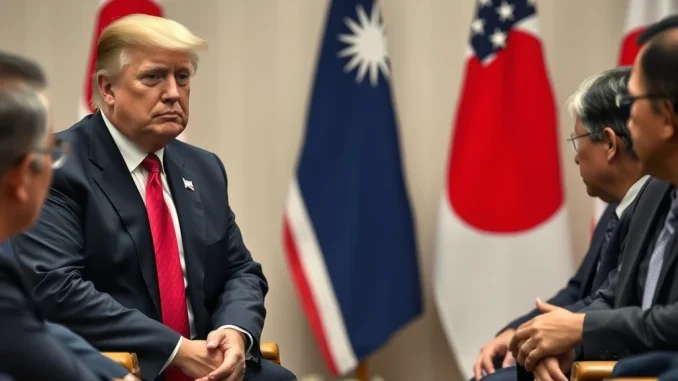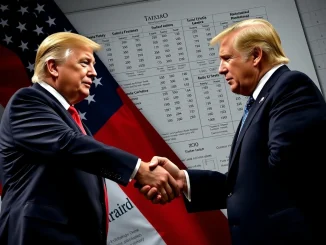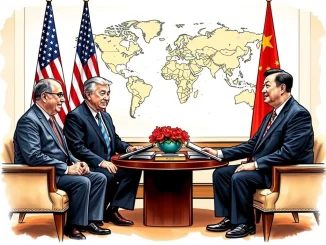
Breaking News Alert! Donald Trump is set to engage in crucial discussions with Japan regarding trade tariffs and defense expenditure. This high-stakes meeting, confirmed by Trump himself via X (formerly Twitter), signals potentially significant shifts in US-Japan relations and could ripple across the global economy. Stay tuned as we unpack what this means and why it matters.
Why Are US-Japan Relations Under the Spotlight?
The upcoming meeting highlights the intricate and often complex dynamics of US-Japan relations. These discussions are not just bilateral; they have far-reaching implications for international trade, security alliances, and the overall global economic landscape. Let’s delve into why this meeting is generating so much buzz:
- Trade Imbalances: Historically, trade imbalances have been a point of contention between the US and Japan. Trump’s focus on tariffs suggests a continued push to address perceived unfair trade practices.
- Defense Burden Sharing: With increasing global uncertainties, the cost and responsibility of defense alliances are constantly under review. Discussions on defense spending are crucial for both nations’ security strategies.
- Geopolitical Significance: Japan’s strategic location and economic power make it a vital ally for the US in Asia. The tone and outcomes of these talks will influence regional stability and power dynamics.
Decoding the Trade Tariffs Agenda
Trade tariffs are a central theme in the upcoming US-Japan dialogue. Tariffs, essentially taxes on imported goods, are powerful tools in international trade policy. But what are the potential implications of Trump’s tariff talks with Japan?
| Aspect | Potential Impact |
|---|---|
| Increased Costs for Consumers | Tariffs can raise the price of imported goods, potentially leading to higher costs for American and Japanese consumers. |
| Impact on Industries | Certain industries, both in the US and Japan, could face challenges or benefits depending on tariff adjustments. For example, industries reliant on imported components might see cost increases. |
| Trade Retaliation | Aggressive tariff policies could provoke retaliatory tariffs from Japan, leading to a trade war scenario, which is detrimental to both economies. |
| Negotiating Leverage | Tariffs can be used as a negotiating tactic to push for broader trade agreements or concessions in other areas. |
Trump Tariffs: A Refresher on Past Policies
The mention of Trump tariffs immediately brings to mind the former president’s assertive trade policies. During his previous term, Trump implemented tariffs on various countries, including key trading partners. Understanding this history is crucial to anticipate the potential direction of these new talks:
- “America First” Approach: Trump’s trade policies were largely driven by an “America First” philosophy, prioritizing domestic industries and jobs.
- Section 232 Tariffs: He utilized Section 232 of the Trade Expansion Act to impose tariffs on steel and aluminum imports, citing national security concerns.
- Trade Disputes: Trump’s tariff policies led to trade disputes with multiple nations, including China, and strained relationships with traditional allies.
- Economic Impact: The economic impact of these tariffs is still debated, with some sectors benefiting while others faced increased costs and reduced export opportunities.
Defense Spending: What’s on the Table?
Beyond trade, defense spending is another critical area of discussion. The US and Japan have a long-standing security alliance, and the allocation of defense costs is a recurring topic. What could these defense spending talks entail?
- Burden Sharing Debate: The US has often urged allies to increase their defense spending to share the burden of collective security more equitably.
- Regional Security Concerns: Rising geopolitical tensions in Asia, particularly concerning North Korea and China, necessitate robust defense capabilities and cooperation.
- Alliance Strengthening: Discussions on defense spending can be an opportunity to reaffirm and strengthen the US-Japan security alliance, demonstrating a united front.
- Military Modernization: Increased defense spending could facilitate the modernization of Japan’s military capabilities and enhance interoperability with US forces.
Global Economy in the Balance
The ramifications of these US-Japan talks extend far beyond their bilateral relationship. The global economy is intricately connected, and decisions made by major economic powers like the US and Japan can have widespread effects. Here’s how these talks could impact the broader global economic landscape:
- Market Volatility: Uncertainty surrounding trade policies and international relations often leads to market volatility. Investors worldwide will be closely watching the outcomes of these discussions.
- Supply Chain Disruptions: Tariffs and trade disputes can disrupt global supply chains, impacting businesses and consumers across borders.
- Geopolitical Stability: The strength of the US-Japan alliance is a cornerstone of stability in Asia. Positive outcomes from these talks can contribute to regional and global security.
- Economic Growth Prospects: Cooperative trade and defense policies can foster a more stable and predictable economic environment, conducive to global growth. Conversely, escalating tensions could hinder economic progress.
Actionable Insights and Takeaways
What should you, as a keen observer of global economic and political trends, take away from this news?
- Monitor Market Reactions: Keep a close eye on financial markets, particularly in Asia, as the talks progress. Market reactions can provide real-time insights into investor sentiment.
- Stay Informed on Policy Details: Follow reputable news sources for updates on the specific issues being discussed and any policy announcements emerging from the meeting.
- Consider Geopolitical Implications: Think about how these talks fit into the broader geopolitical context, especially in Asia, and how they might influence regional dynamics.
- Assess Long-Term Trends: Reflect on the long-term trends in US-Japan relations and the evolving nature of international trade and security alliances.
In Conclusion: A Pivotal Moment for US-Japan Ties
The upcoming meeting between Trump and Japan is more than just routine diplomatic engagement; it’s a pivotal moment for US-Japan relations and the global economy. The discussions on trade tariffs and defense spending are poised to shape the trajectory of this critical alliance and have significant repercussions worldwide. As the world watches, the outcomes of these urgent talks will undoubtedly be closely scrutinized for their immediate and long-term impact on international trade, security, and global stability. Stay informed, stay engaged, and understand the unfolding story of US-Japan relations in this dynamic global landscape.



